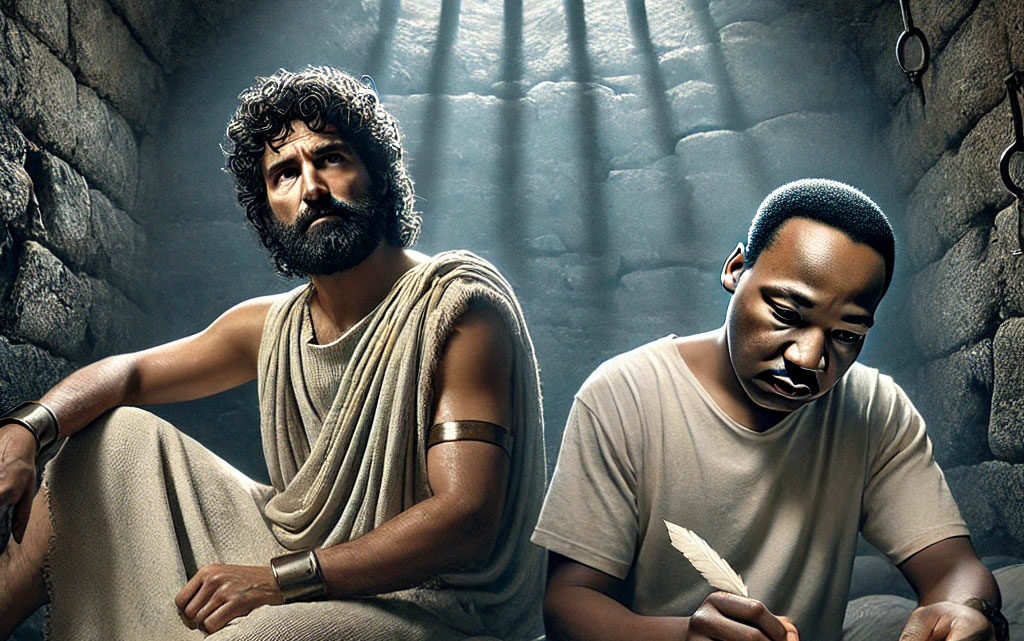Prison walls could not silence the voices of Paul the Apostle or Dr. Martin Luther King Jr. Separated by thousands of years, both men found themselves unjustly imprisoned for their beliefs. Yet rather than succumbing to despair, they used their confinement to craft some of history’s most powerful letters—messages that challenged injustice, defended their missions, and called for moral courage. Paul’s Prison Epistles (Ephesians, Philippians, Colossians, and Philemon) and King’s “Letter from Birmingham Jail” share striking similarities, reflecting a deep conviction that faith requires action, even in the face of suffering.
A Letter Written in Chains
Paul and King were both prisoners, but they did not see their confinement as a setback. Instead, they turned it into a platform to advocate for righteousness. Paul, writing from a Roman prison, reminded the Philippians, “I am in chains for Christ” (Philippians 1:13). His suffering was not in vain—it was part of his divine calling to spread the gospel.
Similarly, King wrote from a cramped jail cell in Birmingham, Alabama, after being arrested for leading nonviolent protests against segregation. He addressed white clergymen who had criticized his methods, explaining why justice could not wait. His words echoed Paul’s unshakable faith: “I am in Birmingham because injustice is here.” Like Paul, King saw his imprisonment as a temporary hardship in the greater mission of justice.
The Moral Responsibility to Act
Both men confronted the issue of just and unjust laws—a theme that runs through Paul’s letters and is central to King’s argument.
Paul, in Romans 13:1-7, urged believers to respect governing authorities. However, in Acts 5:29, he made it clear that God’s law takes precedence over human law: “We must obey God rather than men.” His message was simple: Christians must live righteously, but when earthly laws conflict with divine justice, faithfulness to God comes first.
King built upon this principle in his letter, responding to those who insisted that civil rights activists should wait for a “more convenient season.” He wrote: “A just law is a man-made code that squares with the moral law or the law of God. An unjust law is a code that is out of harmony with the moral law.” His reasoning was profoundly biblical: laws that degrade human dignity must be challenged. Like Paul, he insisted that faith is not passive—it demands action in the face of injustice.
Defending Their Mission
Paul and King both faced opposition from within their own religious communities.
Paul, in Galatians 1:10, defended himself against critics who questioned his apostleship: “Am I now trying to win the approval of human beings, or of God?” His mission was not about popularity; it was about obedience to the gospel.
King, too, responded to religious leaders who accused him of being an “outsider” stirring up trouble. He reminded them that, like the biblical prophets, he was compelled to act: “Injustice anywhere is a threat to justice everywhere.” Just as Paul refused to abandon his calling despite opposition, King stood firm, knowing that the fight for justice was not about pleasing people but about fulfilling God’s will.
Suffering for the Cause
Paul saw suffering as an inevitable part of following Christ. In Philippians 1:29-30, he wrote: “For it has been granted to you on behalf of Christ not only to believe in him, but also to suffer for him.” His own life was proof that faith often leads to hardship, but that hardship has purpose.
King echoed this sentiment, describing his imprisonment not as a tragedy but as part of a greater struggle. He acknowledged the pain but remained steadfast: “We will reach the goal of freedom in Birmingham and all over the nation, because the goal of America is freedom.” Both men saw suffering as a refining fire, a necessary cost of standing for truth.
A Vision of Unity
Perhaps the most profound connection between Paul and King lies in their shared vision of a unified humanity.
Paul wrote in Galatians 3:28, “There is neither Jew nor Gentile, neither slave nor free, nor is there male and female, for you are all one in Christ Jesus.” His gospel shattered the barriers of race, class, and status.
King’s dream echoed this biblical truth. He envisioned a world where racial divisions would be erased, writing, “The goal of America is freedom… the sons of former slaves and the sons of former slave owners will be able to sit down together at the table of brotherhood.” Just as Paul saw Christ as the great unifier, King believed that love, justice, and faith would ultimately triumph over division.
The letters of Paul and Martin Luther King Jr. remind us that faith demands action. Both men faced imprisonment, yet their words transcended prison walls to shape history. They called people to stand for righteousness, even when it was unpopular. They defended their mission against critics. They understood that suffering was part of the journey. And above all, they believed in the power of unity, grounded in divine justice.
Their messages still resonate today. As Paul and King both demonstrated, true faith is not about comfort—it is about courage. And sometimes, the most powerful voices of change come from behind prison bars.
Article curated and edited by Hugh Davis with help from ChatGPT.










